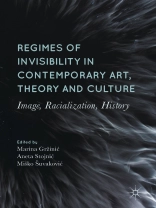This book places a focus on the regimes of in/visibility and representation in Europe and offers an innovative perspective on the topic of global capitalism in relation to questions of race, class, gender and migration, as well as historicization of biopolitics and (de)coloniality. The aim of this volume is to revisit theories of art, new media technology, and aesthetics under the weight of political processes of discrimination, racism, anti-Semitism and new forms of coloniality in order to propose a new dispositive of the ontology and epistemology of the image, of life and capitalism as well as labor and modes of life. This book is firmly embedded in the present moment, when due to rapid and major changes on all levels of political and social reality the need for rearticulation in theoretical, artistic and political practices and rethinking of historical narratives becomes almost tangible.
Inhaltsverzeichnis
1. Introduction: Image, Racialization, History.- 2. Racialized bodies, and the digital (financial) mode of production.- 3. Politics and Aesthetics of Databases and Forensics.- 4. The Emancipation of Necrocapitalism: Teleological Function of Liberalism and the Optimization of Hegemony.- 5. Influence of Western Society on Identity Politics of Sexual and Gender Minorities in Colonial and Post-Colonial India.- 6. Radical Contemporaneity: Politics of the Image in Videos by Gržinić & Šmid.- 7. Affective Constructions: Image – Racialization – History.- 8. Spiritual Revolutions: Afropean Body Politics and the ‚Secularity‘ of the Arts.- 9. “Contingent monuments”: Constructions of Publicness in the Fascist Italy Exhibition Complex, 1920s-1940s.- 10. Screened Otherness: A Media Archaeology of Romani Criminalization.- 11. An Image and its Histories: The Uncovering of Rembrandt’s Masterpiece Lost During the Second World War.-
Über den Autor
Marina Gržinić (Ph D) is a philosopher and artist who lives in Ljubljana and works in Ljubljana and Vienna. She is researcher at the FI SRC SASA (Research Center of the Slovenian Academy of Science and Arts) Ljubljana and professor at the Academy of Fine Arts in Vienna.
Aneta Stojnić (Ph D) is a Belgrade-born theoretician, artist and curator. She is assistant professor at the Faculty of Media and Communications in Belgrade.
Miško Šuvaković (Ph D) is Dean of Faculty for Media and Communications, Singidunum University, Belgrade, and professor of theory of art and media in the Ph D program of transdisciplinary humanities and theory of art.
Contributions by: Marina Gržinić, Adla Isanović, Alanna Lockward, Federica Martini, Aleksa Milanović, Andrea Pócsik, Aneta Stojnić, Miško Šuvaković, Šefik Tatlić, Jelena Todorović












